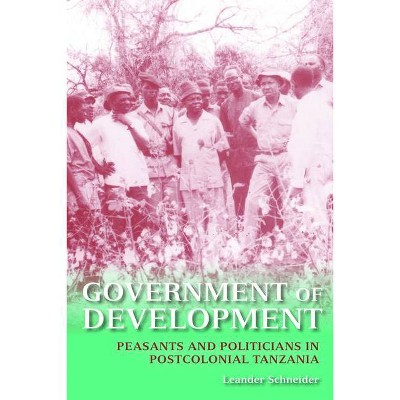Government of Development - by Leander Schneider (Paperback)

Similar Products
Products of same category from the store
AllProduct info
<p/><br></br><p><b> About the Book </b></p></br></br>Government of Development shows that the practices constituting this project's mode of government far exceeded political elites' pursuit of their own narrow interests, the go-to explanation for many accounts of similar instances of authoritarian rule and developmental failures in Africa and beyond.<p/><br></br><p><b> Book Synopsis </b></p></br></br><p>What drives state officials to force development projects on resisting beneficiary populations? In his new analysis of the Tanzanian state's 1960s and 1970s campaign to settle the country's rural population in socialist villages, Leander Schneider traces the discourses and practices that authorized state officials to direct the lives of peasants--by coercive means if necessary. <i>Government of Development</i> shows that the practices constituting this project's mode of government far exceeded political elites' pursuit of their own narrow interests, the go-to explanation for many accounts of similar instances of authoritarian rule and developmental failures in Africa and beyond.</p><p/><br></br><p><b> Review Quotes </b></p></br></br><br><p>Between 1968 and 1977 the Tanzanian government compelled some thirteen million citizens--about 75 percent of the population--to live in registered villages in a process known as ujamaa (socialist) villagization. . . [F]ocuses on official thinking and modes of governance that evolved from an emphasis on freedom and voluntary peasant participation in the mid-1960s to coercion backed by police force by the early 1970s, when most farmers were forced to move. 120.5</p>-- "American Historical Review"<br><br><p>Government of Development makes its argument with vigor, directness, and clarity. Although this is not social history, the book's arguments should resonate with social historians. The fundamental conviction underlying Schneider's argument is that actors in history must be understood not as stereotypes or instruments of class rule, but as complex human characters who exercise agency within particular social constraints. Towards the book's end, having observed that people are driven by 'habit; ideological commitment; vindictiveness; hubris; an unwillingness to surrender; miscalculations, prejudice, ' he concludes that history must 'be read from the standpoint of its agents--and thus not backward from outcomes to underlying causes, but forward, as it flows toward an unpredictable future'. . . . These wise words are useful for all historians, and are particularly welcome as a contribution to the study of the postcolonial African state.</p>-- "International Journal of African Historical Studies"<br><br><p>Responding to Tanzania's activist state, scholars have produced a rich literature on its government and society, carrying insights that travel well beyond its borders. Leander Schneider's compact new book carries this tradition forward honorably. His study not only helps us understand the lessons of Tanzania's disappointing villagization strategy, but also provides a useful methodology for the analysis of political process.</p>-- "The Journal of African History"<br><p/><br></br><p><b> About the Author </b></p></br></br><p>Leander Schneider is Associate Professor of Political Science at Concordia University.</p>
Price History
Price Archive shows prices from various stores, lets you see history and find the cheapest. There is no actual sale on the website. For all support, inquiry and suggestion messagescommunication@pricearchive.us




















